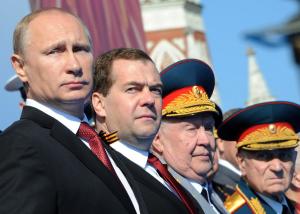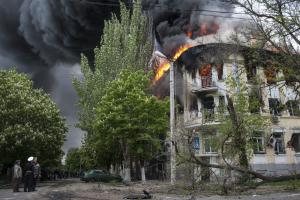SEVASTOPOL, Crimea (AP) — Presiding over a triumphant spectacle of warships and fighter jets, President Vladimir Putin hailed the return of Crimea to Russia as the restoration of "historic justice" before a jubilant, welcoming crowd Friday on the holiday that Russians hold dearest.
In Ukraine's east, where pro-Russia insurgents have seized government buildings and fought with Ukrainian forces, fatal fighting broke out in the city of Mariupol as a police station was set ablaze. The Associated Press saw at least three dead and Ukraine's Interior Minister said around 20 "terrorists" and one policeman were killed.
Russia's annexation of Crimea in March, a few weeks after Ukraine's president was toppled and fled to Russia, was a key event in Ukrainian's months-long crisis, which has now descended into violence.
Putin's visit to the Crimean port of Sevastopol, where Russia's Black Sea Fleet is based, was strongly criticized by both NATO and Ukraine's Foreign Ministry, which said it trampled on Ukraine's sovereignty and international law.
Ukraine is struggling with its most serious crisis in decades as insurgents in the east are grabbing buildings and territory, fighting the central government and preparing to hold a referendum Sunday on secession.
Putin's two Victory Day celebrations, which included a massive show of military muscle in the annual Red Square parade in Moscow and then the extravaganza in Sevastopol, rubbed salt in the wounds of the interim government in Kiev without ever once mentioning its name.
In Sevastopol, Putin rode a cabin-cruiser type boat past hulking warships, issuing greetings to their crews, as warplanes and helicopters swooped over the vast harbor. He then stepped onto land for a short address to the tens of thousands on the shore who came to watch the spectacle.
View gallery

Russian President Vladimir Putin, left, and Prime Minister Dmitry Medvedev attend a Victory Day para …
Victory Day is Russia's most important secular holiday and a key element of the country's national identity, honoring the armed forces and the millions who died in World War II. This year it comes as Russia is locked in the worst crisis with the West since the end of the Cold War.
In his speech, Putin hailed the incorporation of Crimea's 2 million people into Russia as "return to the Motherland" and a tribute to the "historical justice and the memory of our ancestors."
He expanded on the theme in a later address at a commemorative concert, saying Russia respected other countries' interests and "we ask that all of them show regard for our legal interests, including the restoration of historical justice and the right to self-determination."
Crimea had been transferred to Ukraine in 1954 during Soviet times and remained under Ukrainian control until the March annexation, which has not been acknowledged by the West or Kiev. The annexation followed a hastily arranged referendum.
Fighting exploded Friday in Mariupol, a city of 500,000 on the Sea of Azov that is on the main road between Russia proper and Crimea.
An Associated Press journalist saw three dead bodies near the police station, including one man in civilian clothes but with a police helmet. The Donetsk regional administration said three people were killed and 25 wounded during the fighting.
View gallery

A police station is ablaze in Mariupol, eastern Ukraine, Friday May 9, 2014. Fighting between govern …
But Ukraine's Interior Minister Arsen Avakov said in a statement that 20 "terrorists" and one police officer were killed as 60 insurgent gunmen tried to capture the police station and were rebuffed by police and the military.
Avakov said the government was ready to negotiate with those in the east who want to sit down for talks but vowed to destroy those who take up arms. He promised not to let Ukraine "turn into a burning buffer zone, where death will become the norm."
NATO Secretary General Anders Fogh Rasmussen, meanwhile, repeated his stance that Crimea was not part of Russia.
"We consider the Russian annexation of Crimea to be illegal, illegitimate and we don't recognize it," Fogh Rasmussen told reporters in Tallinn, Estonia. "We still consider Crimea as Ukrainian territory and from my knowledge the Ukrainian authorities haven't invited Putin to visit Crimea, so from that point of view his visit to Crimea is inappropriate."
Earlier in Moscow, Putin watched as about 11,000 Russian troops proudly marched across Red Square to the tunes of marches and patriotic songs. They were followed by columns of dozens of tanks and rocket launchers as some 70 combat aircraft, including giant nuclear-capable strategic bombers, roared overhead.
In a dig at Ukraine, the parading troops on Red Square included one marine unit from the Black Sea Fleet that flew the Crimean flag on its armored personnel carriers.
View gallery

Russian President Vladimir Putin, with WWII veterans, lays flowers at a monument to heroic defenders …
The Red Square parade, which featured massive Topol-M intercontinental ballistic missiles, came a day after Putin watched a massive military exercise that simulated a retaliatory nuclear strike in response to an enemy attack.
The West and the Ukrainian government accuse Russia of fomenting the unrest in Ukraine's east, where insurgents have seized government buildings in a dozen of cities and towns. The insurgents are holding a referendum on independence Sunday in the Donetsk and Luhansk regions — an area that encompasses 6.5 million people. The vote is similar to a plebiscite that paved the way for Moscow's annexation of Crimea.
Putin's surprise call Wednesday for the rebels to delay the referendum appeared to reflect Russia's desire to distance itself from the separatists as it bargains with the West. But insurgents in Ukraine's Russian-speaking east defied Putin's call and said they would go ahead anyway.
Putin also said Russia had withdrawn its forces from the Ukrainian border, but Pentagon and NATO repeated again that they had seen no evidence of a pullback. NATO has said Russia has tens of thousands of troops in regions along Ukraine's border, and Ukraine fears Russia could invade and grab more territory.
"We still don't have visible evidence of Russian withdrawal of troops from Ukraine's border," Fogh Rasmussen told reporters Friday. "I would be the first to welcome it if Russian troops were pulled out."
Russia wants Ukraine to adopt a new constitution that would give broad powers to its regions — and would also help Moscow keep the country's east in its orbit. It also has sought guarantees that Ukraine would not join NATO.
Ukraine has rejected the Russian demands.
The head of the Organization for Security and Cooperation in Europe, Lamberto Zannier visited Kiev on Friday and criticized the referendum in the east, calling it a "divisive initiative."
The United States and the European Union have slapped travel bans and asset freezes on members of Putin's entourage in response to the annexation of Crimea.
Despite the sanctions, Putin is set to travel to France in early June for a ceremony marking the 70th anniversary of the D-Day invasion that hastened the end of World War II, his first encounter with Western leaders since the start of the Ukrainian crisis.
___
Isachenkov reported from Moscow. Peter Leonard and Olimpiu Gheorghiu in Mariupol, Ukraine, Yuras Karmanau in Odessa, Ed Brown in Donetsk and Mark Rachkevych, Dmytro Vlasov and Svetlana Kozlenko in Kiev contributed to this report.
View Gallery
Putin makes first visit to Crimea since crisis

After marking a Victory Day celebration in Moscow, the Russian president hits the road.
Red Square show of might